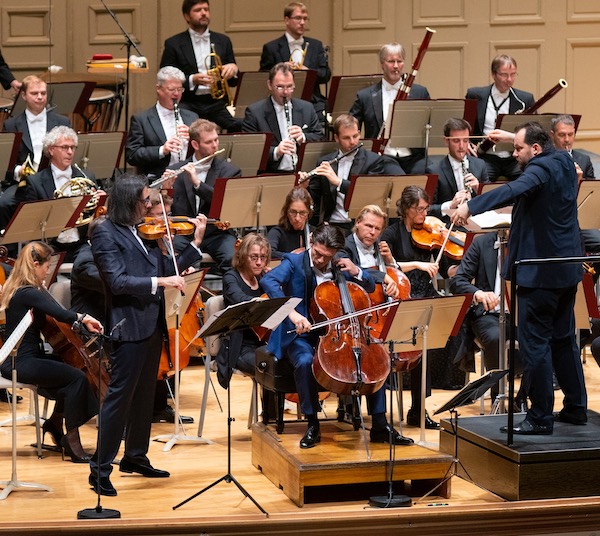Nelsons opens “Leipzig Week” with resplendent Brahms and Schubert

The artistic partnership between the Boston Symphony Orchestra and Leipzig Gewandhaus Orchestra has been a staple of the Andris Nelsons era. Over the past three seasons, the Latvian conductor has led the BSO in music brought into the world by its Leipzig counterpart. And with the Gewandhaus Orchestra, he has explored many of the bristly modern scores that the BSO had premiered in its long history.
This season brings a new dimension to that relationship. On Sunday afternoon, with Nelsons at the helm, the Leipzig Gewandhaus Orchestra opened “Leipzig Week in Boston,” a weeklong series of concerts dedicated primarily to Romantic masterworks. The orchestra’s opening program at Symphony Hall, sponsored by both the BSO and Celebrity Series, began the festivities with resplendent accounts of music by Brahms and Schubert.
Under Nelsons’ guidance, the Gewandhaus Orchestra seems a mirror image of the BSO. While the latter boasts a robust wind section, the Gewandhaus Orchestra’s strings are its strongest voice, capable of projecting colorful shades of light and darkness that inject urgency into every line. The ensemble’s woodwinds and brass are subtle, peeking out of the texture with just enough presence to highlight the chamber-like delicacies of the music explored in Sunday’s program.
In both Brahms’s Concerto for Violin, Cello, and Orchestra and Schubert’s Symphony No. 9, Nelsons revealed the fine details without neglecting the larger structure. Each movement was an exploration of bold and soft instrumental colors, and he crafted the phrases in vocal arcs that built to satisfying heights.
In the Brahms, the conductor led with his usual careful eye, drawing attention to every intimate passage and smooth transformation of timbre that allowed for the afternoon’s soloists—violinist Leonidas Kavakos and cellist Gautier Capuçon—to shine.
The last of Brahms’s orchestral works, the Double Concerto may lack the captivating drama of his more popular Violin Concerto. Yet some of its solo passages unfold into grand statements that still have the power to captivate.
The work, however, is ultimately an expression of balance and elegance, particularly in its solo lines, which frequently flow into one another. In Sunday’s performance, Kavakos and Capuçon played with such alert sensitivity that they could practically finish each other’s phrases.
Together, the musicians played with expressive warmth that brought out the colorful shades of their solos, each varying his pacing and tone. In the lyrical passages of the first movement, their two instruments seemed to sound with one voice as Capuçon’s dusky phrases unfolded into Kavakos’s sunlit upper register. Even when they dug in for the agitated passages that bring the movement to a close, they remained a cohesive duet.
The remaining movements also showcased the duo in similarly expressive moments. In the second, they shaped the melody with a singer’s grace, the music rising and falling like breath. The Rondo provided a fitting departure, the movement coursing with apt gypsy swagger. Kavakos and Capuçon brought additional delicacy and flair to their encore, the “Très vif” from Ravel’s Sonata for Violin and Cello.
After intermission, Nelsons led a dynamic performance of Franz Schubert’s Symphony No. 9.
Schubert’s final symphony bears all the hallmarks of his mature style. Though the work’s vigorous passages show indebtedness to Beethoven (who died one year before Schubert), the sections scored for winds reveal a lyricism the composer explored in his many songs.
Nelsons’s reading revealed every dramatic nuance. The slow introduction moved with congenial flow, with the conductor taking his time with the French horn and wind themes. The development section tilted the music briefly towards darkness, and the recapitulation delivered sudden energy as Nelsons drew out every percussive accent.
Unlike his practice with the BSO, Nelsons situates the violins of the Gewandhaus Orchestra antiphonally, which made the intricacies of Schubert’s string writing in the second movement all the more apparent.
But this reading ultimately revealed a sense of grandeur and momentum. The pause near the second movement’s end carried requisite tension, which released into the rosy-toned cello theme that followed. The Scherzo sounded with seismic force; the Trio moved with soft, Viennese lilt. The energy returned in the propulsive finale, which Nelsons built steadily into a resounding conclusion.
“Leipzig Week in Boston” continues as Andris Nelsons leads the Leipzig Gewandhaus Orchestra in music by Mahler, Mendelssohn, Schumann, and Wagner 8 p.m. Tuesday at Symphony Hall. celebrityseries.org; 617- 482-6661
Posted in Performances